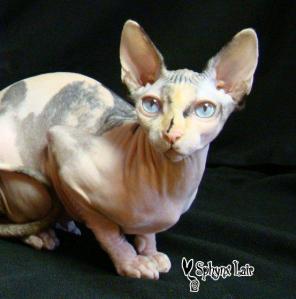 So you’re doing your everyday business cleaning the house, or working from home on your computer and suddenly you hear a sound of running water from your precious Sphynx litter box with a horrific smell that literally chases you and your other family members from the room! Diarrhea or any other bowel issues can be caused by many things like IBS (irritable bowel syndrome) but too many times there is one little pain in the but parasite that goes untreated or misdiagnosed, that would be called Giardia.
So you’re doing your everyday business cleaning the house, or working from home on your computer and suddenly you hear a sound of running water from your precious Sphynx litter box with a horrific smell that literally chases you and your other family members from the room! Diarrhea or any other bowel issues can be caused by many things like IBS (irritable bowel syndrome) but too many times there is one little pain in the but parasite that goes untreated or misdiagnosed, that would be called Giardia.
What is Giardia you ask?
If your Sphynx has these symptoms, chronic diarrhea, horrible smelly poop, soft stools, bloody diarrhea, and sometimes even vomiting it’s quit possible he or she has Giardia. The parasite lives in the intestinal tract and causes damage to the intestines. Giardia is commonly seen in young cats confined together in groups, such as a cattery, kennels, shelters, and pet stores.
Symptoms
Diarrhea is the most common sign of infection. Some cats may vomit in addition to the diarrhea. Weight loss may occur secondary to the diarrhea. The cat may still have a good appetite as well but still have the diarrhea. In many instances, a cat may be infected with Giardia, but show no clinical signs at all. So when you tell your vet after days and weeks of chronic, smelly diarrhea that you think it may be Giardia, and he or she shakes their head no, insist he or she prescribe treatment for your sphynx which generally would be Metronidazole (Flagyl).
Diagnosis
There are several ways to diagnose Giardia infection. The most common methods involve analysis of a fecal smear. Direct analysis of a fecal sample may lead to a quick diagnosis. A fecal sample can also be sent to a diagnostic laboratory for more sophisticated testing. Many vets misdiagnose Giardia because sometimes it takes several samples to show positive! So do not take no for an answer!
Treatment
Metronidazole (Flagyl) has been used extensively to treat Giardia in dogs and cats, as well as in people. This drug has an added advantage of being effective against other protozoans and some bacteria that might also be contributing to the diarrhea. Side effects involving the nervous system have been reported in some animals, although this is uncommon. Cats with Giardia need to have their prescribed medication administered faithfully. High fiber diets often provide additional help in controlling the diarrhea along with pumpkin. If you have other pets, all animals should be treated to prevent reinfection or transfer back into the home. Bathing all animals infected is recommended before introducing them into an uncontaminated environment which allows for removal of feces and infective cysts from the hair, coat or in the Sphynx case skin.
Prevention
Decontamination is recommended in multiple pet households and in crowding situations (kennels, a cattery, shelters, or pet stores), proper sanitation is key to prevent cross contamination from one animal to another. All fecal material needs to be removed from cages, runs, and yard. Kennels and cages need to be cleaned with proper disinfectants and let totally dry before allowing animals back into them.







